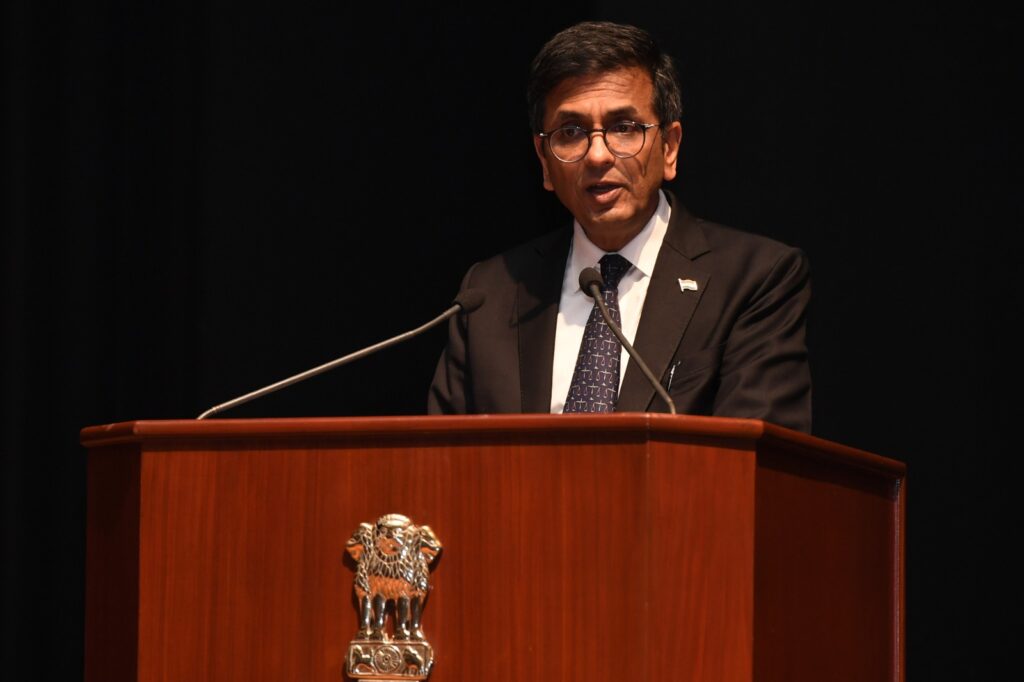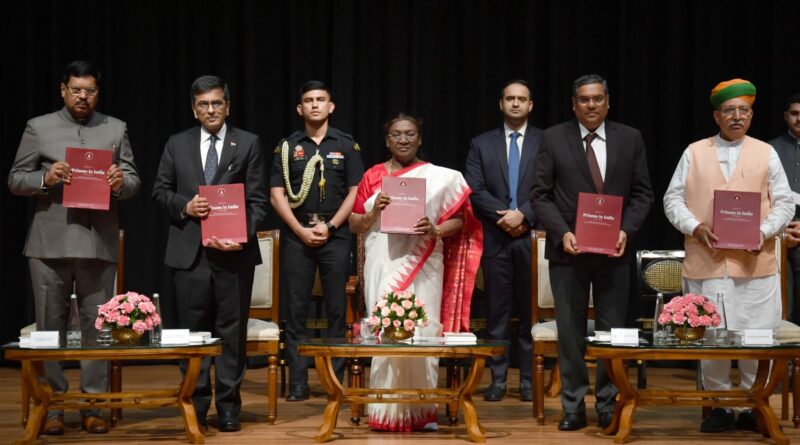CJI DY Chandrachud Acknowledges President Murmu’s 2022 Constitution Day Speech for Inspiring Supreme Court’s Prison Reform Report
(Judicial Quest News Network)
New Delhi: In a landmark event today, Chief Justice of India (CJI) DY Chandrachud credited President Droupadi Murmu’s 2022 Constitution Day speech for sparking the pivotal conversation that led to the Supreme Court’s newly released report on prison reforms in India. Addressing the gathering at Rashtrapati Bhavan, where the President launched three significant Supreme Court publications, CJI Chandrachud noted that the President’s address had inspired the judicial push for prison reform, decongestion, and the development of guidelines for improving conditions in Indian prisons.
Prison Reform Report: A Step Toward Judicial Action
President Murmu, in her address, welcomed the publication of the comprehensive report on prison reforms, emphasizing the longstanding concern regarding the state of the prison system in India. She noted that the status of prisons, particularly the large number of undertrial prisoners, had been a matter of serious concern for years. “This report seeks to understand the role of the judiciary in reducing the number of undertrial prisoners and addresses the ongoing issues of prison decongestion,” President Murmu said.
The event marked a milestone in the Supreme Court’s efforts to enhance transparency and accountability in the Indian justice system. During her speech, the President highlighted the crucial role the judiciary plays in addressing ground-level challenges and improving access to justice.
Supreme Court’s Year of Reflection
The event also served as a platform for CJI Chandrachud to discuss the Supreme Court’s 75th anniversary, which is being celebrated in 2024. He revealed that as part of the ongoing celebrations, the Supreme Court had unveiled a new flag and insignia earlier in the year. These publications, he explained, are part of the Court’s commitment to self-reflection and its efforts to provide resources that would guide stakeholders in understanding the key challenges facing the justice system.
The three publications released during the event include:
- Justice for the Nation: Reflections on 75 Years of the Supreme Court of India
- Prisons in India: Mapping Prison Manuals and Measures for Reformation and Decongestion
- Legal Aid through Law Schools: A Report on the Working of Legal Aid Cells in India
CJI Chandrachud explained that these works represent critical areas of legal development, judicial reforms, and access to justice. “These publications are more than just academic exercises; they are tools for practical solutions to ongoing issues in the legal system,” he remarked.

Insights into Prison Reforms and Caste-Based Discrimination
Discussing the prison reform report, CJI Chandrachud shared that the document analyses prison manuals across various states and Union Territories, assessing their constitutional alignment and evaluating the role of the district judiciary in ensuring fair bail practices and alternative punishments. One of the key findings was the deeply ingrained caste-based discrimination in prison assignments. The report found that prisoners from marginalized castes were often relegated to sanitation and other menial tasks. CJI Chandrachud referred to a recent Supreme Court ruling, which directed Union Territories to amend prison manuals to eliminate such discriminatory practices. He reaffirmed that caste-based discrimination in prisons is unconstitutional and must be eradicated.
The report also addresses gender-related concerns, including menstrual equity and reproductive rights for female prisoners, as well as initiatives aimed at combating addiction among inmates. These are issues that, according to the CJI, have long been neglected in prison reform discussions.
Legal Aid and the Role of Law Schools
In addition to prison reforms, the third report, Legal Aid through Law Schools, was highlighted as an essential document focusing on the functioning of legal aid clinics across law schools in India. The report identifies 17 key areas for improvement, including the need for greater involvement of legal professionals to supervise students and the provision of better legal advice and drafting assistance. CJI Chandrachud stressed that this initiative aims to instill a sense of service and social responsibility in future lawyers while ensuring that legal aid is accessible to marginalized communities.
President Murmu’s Praise for Judicial Initiatives
In her address, President Murmu praised the Supreme Court’s continued efforts to make justice more accessible, particularly through initiatives like special Lok Adalats and its ongoing engagement with district judicial officers to address grassroots challenges. Reflecting on India’s colonial past, the President emphasized that the judiciary must remain an instrument of social change, rooted in Indian values, and free from colonial legacies.
She expressed admiration for the Supreme Court’s efforts to create a jurisprudence that upholds fundamental rights and social justice, and noted that the Justice for the Nation essays provide a valuable overview of the Court’s influence over the last 75 years.
CJI’s Call for a New Legal Mindset
CJI Chandrachud also called on law students and future legal professionals to consider the broader implications of their work. “The role of law schools and legal aid clinics is crucial in shaping the next generation of lawyers who will not only serve their clients but also contribute meaningfully to social justice,” he stated.
Justice Sanjiv Khanna, who was also present at the event, expressed his support for the publications, highlighting that these reports will play an important role in advancing legal education and reform in India.
A New Chapter for Indian Judiciary
As India moves forward into the 75th year of its Supreme Court, the release of these reports marks a significant step in the country’s ongoing quest for justice and legal reform. With a focus on transparency, decongestion, and access to justice for all, these publications are set to drive future discussions and reforms that will shape the legal landscape in India for generations to come.




